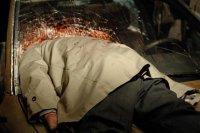
Stuck (Movie Review)
Mena Suvari has carved out a comfortable lower middle class existence for herself. By day she works as a nursing assistant at a retirement home where other people’s grandparents call for her by name when they’ve soiled themselves. By night she parties in nightclubs with her drug dealer boyfriend. Most people wouldn’t consider it a glamorous lifestyle, but for a girl who is a love triangle and a midget away from being a guest on the Jerry Springer Show, things could be much worse.
Meanwhile, things couldn’t get much worse for Stephen Rea. In the course of a day he finds himself kicked out of his ratty studio apartment, unable to get unemployment benefits due to a clerical error combined with a healthy dose of government bureaucracy, and finally living on the streets sharing a bottle of rotgut with a wino.
The two characters’ paths collide both literally and figuratively when, after a night of booze and ecstasy-fueled debauchery to celebrate getting a promotion at work, Suvari plows her car into Rea, throwing him over the hood and lodging him headfirst into the windshield. Suvari panics and drives off with Rea bloody and sprawled on the hood of her car. She initially tries to drop him off at a hospital but is scared away when some people come near so instead she drives home with Stephen Rea stuck to her windshield like a bug.
When she gets home she realizes he’s still alive but instead of helping him she chooses instead to have some trauma sex with her boyfriend. With that decision, Rea’s fate is settled: he has to find a way to extract himself from the windshield and/or call for help before Suvari and her boyfriend figure out how to cover up the accident and dispose of the evidence.
Stuart Gordon made his name as a director who understands how to combine pitch-black comedy with gore-soaked horror with his 1985 debut “Re-Animator”. The gore is hard to miss in "Stuck" but the comedy is very much of the absurd kind and it's played so straight-faced that casual audiences might never realize that Gordon isn't absolutely serious with the material.
In many respects this is probably the film’s greatest weakness. It sound strange to say that the biggest fault of a movie about a dying man wedged into a car windshield is that it is too restrained, but the film never really seems to reach the potential of its premise. Gordon aims for the gallows humor of Hitchcock or the Coen Brothers but the end product feels much more like a video-era exploitation movie from the 80s. Maybe I’m just a cynic but I found myself wishing the humor was a bit more uncomfortable and closer to the surface and that the characters would be just a little nastier.
Gordon goes out of his way to establish Suvari’s character as a fundamentally decent person who makes a very bad decision. I can appreciate that he didn’t want to make her and her boyfriend into over-the-top, unfeeling caricatures and that he wanted to preserve the “it could happen to you” aspect of the story (which was, after all, based on real life events), but trying to play the film as both tragedy and comedy only serves to water down both elements.
Admittedly, this a delicate and difficult path to walk. In a film where most of the characters are already dangerously close to being stereotypes, going for an all-out broad comedy with less moral ambiguity probably wouldn’t make a better film. Suvari is too sympathetic for us to really laugh at and dislike, but all the humor and gory slapstick prevents us from fully identifying with her. The film never forces us to choose a side, so it's hard to care much when the climax comes around.
Also disappointing is the relative lack of interaction between Suvari and Rea. Both are capable actors and there is a lot of potential drama that could be wrung out of Suvari’s dilemma that mostly goes untouched. Between the accident and the final confrontation the two are mostly kept apart when it would have been interesting to see more scenes of Rea begging for mercy and Suvari coming to terms with the cold-blooded decision she’s made.
The story seems ideal for a small and intimate two character piece, but instead we’re treated to secondary characters who stumble into the story and just as quickly stumble out without any real consequences. As it is, Rea does as admirable a job as can be expected of an actor forced to work while covered in blood and wedged in a windshield, but for most of his scenes he isn’t given anyone to interact with.
Suvari fares better by having her cheating, drug-dealing boyfriend around to play off of. He likes to project the image of being a connected and dangerous gangsta but it’s clear that he’s as in over his head as Suvari. A lot of the fun of their scenes together comes from him drawing on experience that obviously comes more from movies and hip hop albums than anything that has actually happened to him.
The biggest surprise of the movie is that by the time the ending rolls around we find out that despite the daring, original premise, this is actually a fairly conventional film. That’s not to say it’s a bad film – all around it is very well done and entertaining. It’s just with the amount of talent involved and the dramatic and comedic potential the story holds, this could have been a great film.
Maybe it’s unfair to hold Gordon to a higher standard when many of the other directors of classic 80s horror films seem to be content with resting on their laurels while churning out subpar movies with their name above the title, but Gordon has been on a comeback recently and if "Stuck" had taken a few more chances and hadn't stayed so close to the middle of the road, it might have had a shot at becoming a modern classic.

